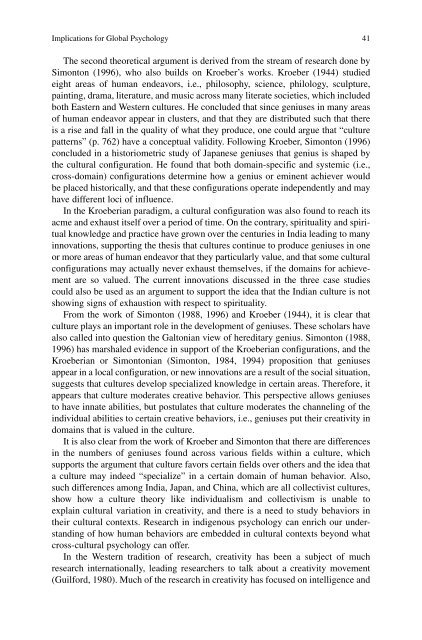Spirituality and Indian Psychology: Lessons from ... - Mandhata Global
Spirituality and Indian Psychology: Lessons from ... - Mandhata Global
Spirituality and Indian Psychology: Lessons from ... - Mandhata Global
You also want an ePaper? Increase the reach of your titles
YUMPU automatically turns print PDFs into web optimized ePapers that Google loves.
Implications for <strong>Global</strong> <strong>Psychology</strong><br />
The second theoretical argument is derived <strong>from</strong> the stream of research done by<br />
Simonton (1996), who also builds on Kroeber’s works. Kroeber (1944) studied<br />
eight areas of human endeavors, i.e., philosophy, science, philology, sculpture,<br />
painting, drama, literature, <strong>and</strong> music across many literate societies, which included<br />
both Eastern <strong>and</strong> Western cultures. He concluded that since geniuses in many areas<br />
of human endeavor appear in clusters, <strong>and</strong> that they are distributed such that there<br />
is a rise <strong>and</strong> fall in the quality of what they produce, one could argue that “culture<br />
patterns” (p. 762) have a conceptual validity. Following Kroeber, Simonton (1996)<br />
concluded in a historiometric study of Japanese geniuses that genius is shaped by<br />
the cultural configuration. He found that both domain-specific <strong>and</strong> systemic (i.e.,<br />
cross-domain) configurations determine how a genius or eminent achiever would<br />
be placed historically, <strong>and</strong> that these configurations operate independently <strong>and</strong> may<br />
have different loci of influence.<br />
In the Kroeberian paradigm, a cultural configuration was also found to reach its<br />
acme <strong>and</strong> exhaust itself over a period of time. On the contrary, spirituality <strong>and</strong> spiritual<br />
knowledge <strong>and</strong> practice have grown over the centuries in India leading to many<br />
innovations, supporting the thesis that cultures continue to produce geniuses in one<br />
or more areas of human endeavor that they particularly value, <strong>and</strong> that some cultural<br />
configurations may actually never exhaust themselves, if the domains for achievement<br />
are so valued. The current innovations discussed in the three case studies<br />
could also be used as an argument to support the idea that the <strong>Indian</strong> culture is not<br />
showing signs of exhaustion with respect to spirituality.<br />
From the work of Simonton (1988, 1996) <strong>and</strong> Kroeber (1944), it is clear that<br />
culture plays an important role in the development of geniuses. These scholars have<br />
also called into question the Galtonian view of hereditary genius. Simonton (1988,<br />
1996) has marshaled evidence in support of the Kroeberian configurations, <strong>and</strong> the<br />
Kroeberian or Simontonian (Simonton, 1984, 1994) proposition that geniuses<br />
appear in a local configuration, or new innovations are a result of the social situation,<br />
suggests that cultures develop specialized knowledge in certain areas. Therefore, it<br />
appears that culture moderates creative behavior. This perspective allows geniuses<br />
to have innate abilities, but postulates that culture moderates the channeling of the<br />
individual abilities to certain creative behaviors, i.e., geniuses put their creativity in<br />
domains that is valued in the culture.<br />
It is also clear <strong>from</strong> the work of Kroeber <strong>and</strong> Simonton that there are differences<br />
in the numbers of geniuses found across various fields within a culture, which<br />
supports the argument that culture favors certain fields over others <strong>and</strong> the idea that<br />
a culture may indeed “specialize” in a certain domain of human behavior. Also,<br />
such differences among India, Japan, <strong>and</strong> China, which are all collectivist cultures,<br />
show how a culture theory like individualism <strong>and</strong> collectivism is unable to<br />
explain cultural variation in creativity, <strong>and</strong> there is a need to study behaviors in<br />
their cultural contexts. Research in indigenous psychology can enrich our underst<strong>and</strong>ing<br />
of how human behaviors are embedded in cultural contexts beyond what<br />
cross-cultural psychology can offer.<br />
In the Western tradition of research, creativity has been a subject of much<br />
research internationally, leading researchers to talk about a creativity movement<br />
(Guilford, 1980). Much of the research in creativity has focused on intelligence <strong>and</strong><br />
41

















